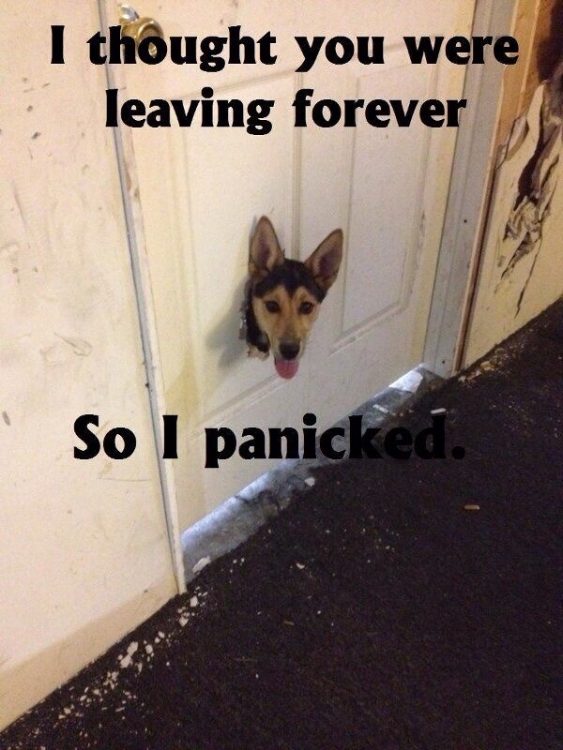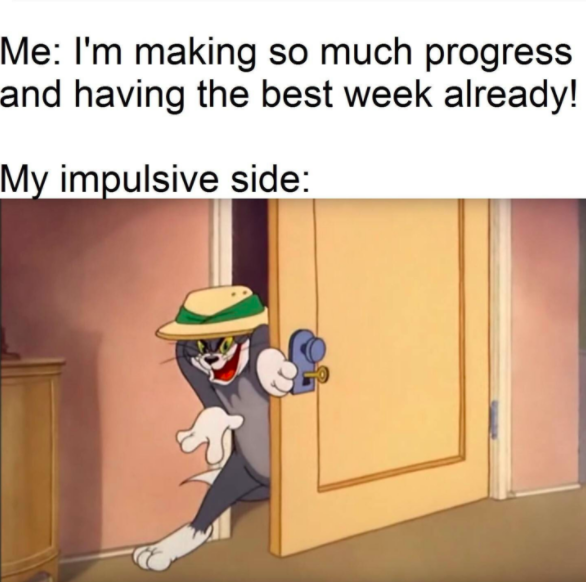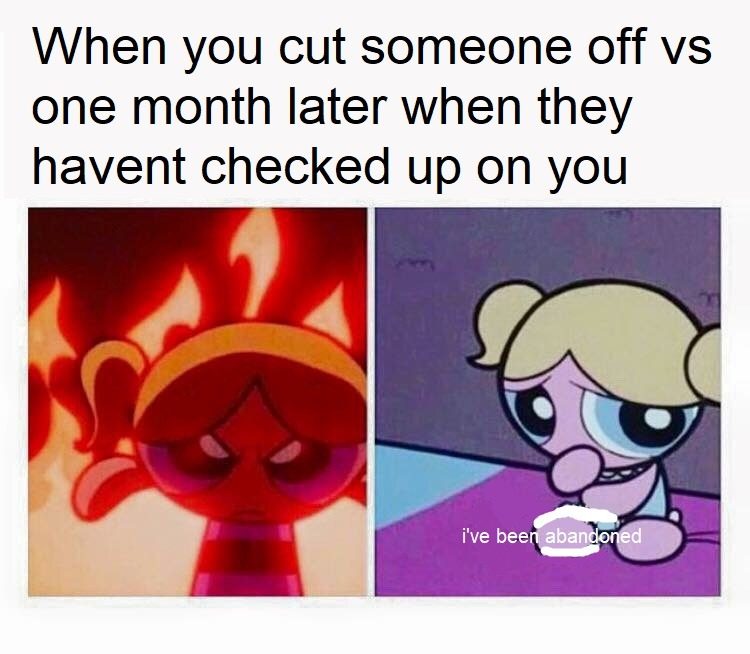9 Symptoms of Borderline Personality Disorder – as Explained by Memes
While there’s nothing funny about living with borderline personality disorder (BPD), sometimes people use humor to share what it’s like experiencing the nine classic symptoms of BPD.
To shed some light on what these symptoms are, we pulled together memes created by the online BPD community, and rounded up responses from members of our own Mighty mental health community. If you live with BPD, you might be able to relate.
1. Frantic Efforts to Avoid Abandonment
An intense fear of abandonment, even going to extreme measures to avoid real or imagined separation or rejection. (via Mayo Clinic)

Though many people experience fears of being abandoned, the intensity of this fear can sometimes make life difficult if you live with BPD. In her piece, “How Fear of Abandonment Affects the Other Symptoms of My Borderline Personality Disorder,” Mighty contributor Katie Kent describes how this symptom can manifest for many with BPD.
Note that it’s not enough to simply fear abandonment. If you have this trait of BPD, you will need to be actively doing things to avoid abandonment. “Frantic” things. What does that mean? Well, it can be different for different people. Two people with BPD may react in entirely opposite ways. One might keep everything to themselves, panicking that if they tell people how they’re feeling, people will leave them. Others might think they need to go around telling everyone how sick they are so people feel sorry for them and don’t leave them.
2. “Splitting”
Unstable personal relationships that alternate between idealization— “I’m so in love!”— and devaluation — “I hate her.” This is also sometimes known as “splitting.” (via National Alliance on Mental Illness)
why made limmy into a bpd meme pic.twitter.com/Lg5pfBfpeh
— kat Ⓥ (@spookymulderr) January 5, 2017
“Splitting,” or “black and white thinking,” is a particular struggle for many people with borderline personality disorder. Mighty contributor Sarah Cooper described what it feels like for her in her piece, “The Symptom of BPD That Makes My World Black and White.”
Splitting is a coping defense mechanism people with BPD use to avoid rejection or being hurt. It means that someone is either good or they are bad. There are no good people who make mistakes. There are no bad people who are nice sometimes. It is black and white, good or bad. I know this feeling, and I recognize it in my own behavior. Splitting feels like self-destructive behavior. I can get consumed in my anger toward people. All my memories with that person become tainted, bad and wrong. Just thinking of them fills me up with anger.
3. Unstable Self-Image
Distorted and unstable self-image, which affects moods, values, opinions, goals and relationships. (via National Alliance on Mental Illness)
this meme is me with my bpd pic.twitter.com/DRChDwcIRO
— Yung cruise control slash me riding a bike (@tripleslots) February 13, 2017
Unstable self-image can mean different things to different people struggling with BPD. For some, it may mean having a distorted or devalued self-image informed by prior trauma. For others, it may mean living with the constant question, Who am I? For others, it may mean something else still.
In her piece, “The BPD Symptom I Find Hardest to Explain to Others,” Mighty contributor Suz Hemming Qbe describes latching on to things to give her the identity she struggled to find.
I have spent the entirety of my life from my teenage years up until now in my 30s, vicariously living through constructed versions of myself which I attached my entire sense of identity, meaning and purpose to. I’m an “all eggs in the one basket” kind of girl. Not in the sense that I chose to distribute them all in one place when I had several other options, but in the sense that there has only ever been the one basket.
4. Impulsive Behaviors
Impulsive and risky behavior, such as gambling, reckless driving, unsafe sex, spending sprees, binge eating or drug abuse, or sabotaging success by suddenly quitting a good job or ending a positive relationship. (via Mayo Clinic)

Sometimes behaviors that present outwardly can be indicative of something going on much deeper psychologically. This can definitely be the case for impulsive behaviors. Mighty contributor Kayla Anderson, who experienced impulsive behavior as a result of her own BPD, delved into why she engaged in the behaviors she did.
Promiscuous sex, alcohol and spending money. If I didn’t feel loved by someone, I was seeking a lot of attention from men just to feel something, anything. There wasn’t even any real connection with the person, I just wanted to feel desired during times I was feeling so empty and alone. At that time, I truly thought my worth was defined by someone loving or not loving me. I would drink often, almost every night. I would spend money I didn’t have, put myself in extreme amount of debt just because shopping was, I thought, therapeutic.
5. Suicidal Behavior or Self-Harm
Suicidal threats or behavior or self-injury, often in response to fear of separation or rejection. (via Mayo Clinic)

All light-hearted humor aside, suicidal behaviors and self-harm can be serious and debilitating symptom for many people with borderline personality disorder.
In his piece, “When You Don’t Fit the ‘Classic’ Definition of Borderline Personality Disorder” Mighty contributor Matthew Gemma (a self-described “quiet” borderline) shares why he continues to struggle with self-harm.
Editor’s note: If you experience suicidal thoughts or struggle with self-harm, the following description could be potentially triggering. You can contact the Crisis Text Line by texting “START” to 741-741.
To cope with these emotions we turns against ourselves with self-hatred. Personally, I always cut myself to atone for how bad of a person I was. You drove them off. You deserve pain. It’s only fair you atone for this. Once I had self-harmed, I felt like I had atoned for how evil I am. Eventually it got so bad there was barely a spot on my body which hadn’t been inflicted with some form of pain. Once again, acting against ourselves. Sometimes done out of self-hate, sometimes done as a punishment to someone we saw as bad, even though just moments earlier we had been talking about how great they are, what a saint they have been.
6. Periods of Emotional Intensity
Wide mood swings lasting from a few hours to a few days, which can include intense happiness, irritability, shame or anxiety. (via Mayo Clinic)
when you see a funny bpd meme but then realize you've got a severe mental illness that will either kill you or make you suffer FOREVER pic.twitter.com/0wN5pJflfd
— Marie (@marivinther) April 21, 2017
This symptom is perhaps why borderline personality disorder can be confused for bipolar disorder. But the cycles of emotions people with BPD face are often a lot quicker than the cycles characteristic of bipolar.
In her piece, “The Emotional Intensity of Borderline Personality Disorder,” Mighty contributor Daisy Atkin shared what emotional intensity is like for her,
Truth is, I’m just trying to cope with the intensity of my emotions – which at this moment in time, are shame and sadness.
To the average person, these emotions would be uncomfortable at best. You might feel your face burn with shame, or a “hot, prickly” feeling creep up your back. But you can probably rationalize these for what they are, and soon enough may yourself laughing about whatever it was which made you feel that way. For me, however, these emotions are so strong, so intense, that it is like being burned by a fire over and over again. The wounds never heal, and each time a strong emotion overcomes you, the wound is reopened and scratched raw again.
7. Chronic Feelings of Emptiness
Chronic feelings of boredom or emptiness. (via National Alliance on Mental Illness)

Feeling empty is something many people experience in life at some point. But for many with BPD, this is a chronic feeling and may result in constantly searching for something to fill the void.
Mighty contributor Rachael Sloan wrote about experiencing chronic emptiness and being misunderstood in her piece, “The Loneliness of Living With Borderline Personality Disorder.” She wrote, “How do you explain to someone the burning feeling of emptiness in your stomach, swimming through your veins, breaking you down from the inside?”
8. Intense or Uncontrollable Anger
Inappropriate, intense or uncontrollable anger — often followed by shame and guilt. (via National Alliance on Mental Illness)

Though not all people who have BPD experience uncontrollable anger, or what some call, “borderline rage,” it is a symptom some experience. But while it’s easy to focus on the anger itself, we can often ignore the guilt someone with BPD may feel after an anger episode.
In his piece, “Why I’m Not a Monster: Deconstructing Male Borderline Personality Disorder,” Mighty contributor Ben Houghton describes this anger and subsequent guilt.
I’ve always referred to my BPD as like having Anakin Skywalker (pre-Darth Vader) as my internal monologue, transforming into the Incredible Hulk when I have an episode which leaves me feeling drained and overwhelmed with remorse afterward.
9. Dissociation
Dissociative feelings — disconnecting from your thoughts or sense of identity, or “out of body” type of feelings — and stress-related paranoid thoughts. Severe cases of stress can also lead to brief psychotic episodes. (via National Alliance on Mental Illness)

Dissociation is different for every person who experiences it. Some may feel it physically, and others may experience “emotional dissociation.”
In her piece, “What Depersonalization Feels Like,” Tilly Neo shared what dissociation, derealization and depersonalization physically feel like to her in a poem.
Floating in a bubble just above my own head, puppeteering my body, clumsily, on strings.
My physical sensations are dulled, except sounds, which are weirdly amplified and out of sync.
I can think clearly as the me inside the bubble, but not as the me in the body. The me in the body feels distant, far away, like another person.
My voice comes out but is strange and far away sounding…
I feel like I am piloting my body by remote control.
If you live with BPD and experience any of these symptoms, know you aren’t alone, and there is help available. If you or someone you know needs help, visit our suicide prevention resources page. If you need support right now, call the National Suicide Prevention Lifeline at 1-800-273-8255 or text “START” to 741-741.
To read more stories about BPD, please “like” Borderline Personality Disorder on The Mighty.

